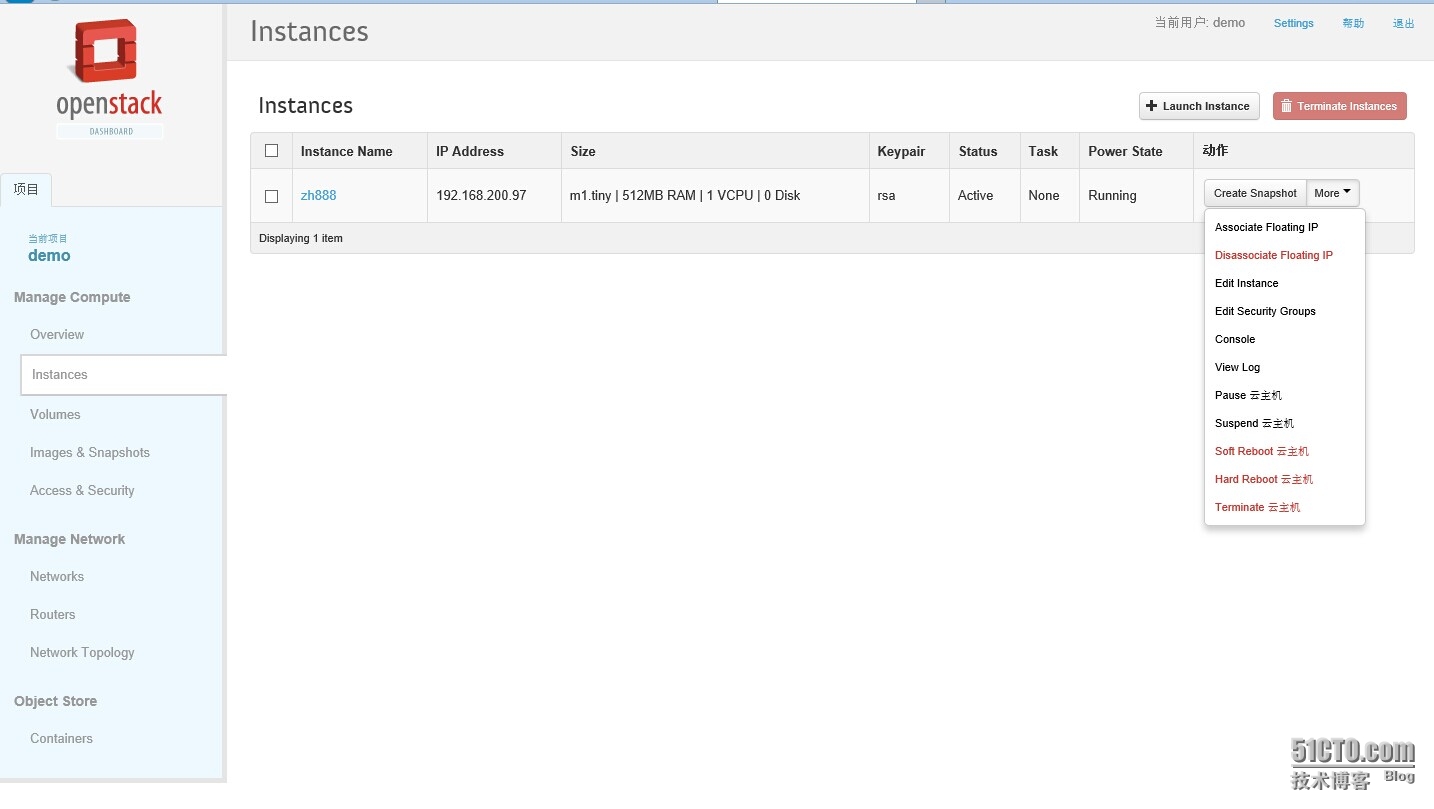centos 6.5 x64bit 快速安装openstack
OpenStack是一个美国国家航空航天局和Rackspace合作研发的,以Apache许可证授权,并且是一个自由软件和开放源代码项目。
OpenStack是一个云平台管理的项目,它不是一个软件。这个项目由几个主要的组件组合起来完成一些具体的工作。
OpenStack是一个旨在为公共及私有云的建设与管理提供软件的开源项目。它的社区拥有超过130家企业及1350位开发者,这些机构与个人都将OpenStack作为基础设施即服务(简称IaaS)资源的通用前端。
OpenStack项目的首要任务是简化云的部署过程并为其带来良好的可扩展性。本文希望通过提供必要的指导信息,帮助大家利用OpenStack前端来设置及管理自己的公共云或私有云。
OpenStack 是由 Rackspace 和 NASA 共同开发的云计算平台,帮助服务商和企业内部实现类似于 Amazon EC2 和 S3 的云基础架构服务(Infrastructure as a Service, IaaS)。OpenStack 包含两个主要模块:Nova 和 Swift,前者是 NASA 开发的虚拟服务器部署和业务计算模块;后者是 Rackspace开发的分布式云存储模块,两者可以一起用,也可以分开单独用。OpenStack 是开源项目,除了有 Rackspace 和 NASA 的大力支持外,后面还有包括 Dell、Citrix、 Cisco、 Canonical 这些重量级公司的贡献和支持,发展速度非常快,有取代另一个业界领先开源云平台 Eucalyptus 的态势。
1.[root@localhost ~]# yum install -y http://rdo.fedorapeople.org/openstack/openstack-grizzly/rdo-release-grizzly-1.noarch.rpm //安装openstack-grizzly源
Loaded plugins: fastestmirror, security
base | 3.7 kB 00:00
base/primary_db | 4.4 MB 00:05
extras | 3.4 kB 00:00
extras/primary_db | 19 kB 00:00
updates | 3.4 kB 00:00
updates/primary_db | 3.7 MB 00:03
Setting up Install Process
rdo-release-grizzly-1.noarch.rpm | 7.1 kB 00:03
Examining /var/tmp/yum-root-tkysSj/rdo-release-grizzly-1.noarch.rpm: rdo-release-grizzly-1.noarch
Marking /var/tmp/yum-root-tkysSj/rdo-release-grizzly-1.noarch.rpm to be installed
Resolving Dependencies
--> Running transaction check
---> Package rdo-release.noarch 0:grizzly-1 will be installed
--> Finished Dependency Resolution
Dependencies Resolved
================================================================================
Package Arch Version Repository Size
================================================================================
Installing:
rdo-release noarch grizzly-1 /rdo-release-grizzly-1.noarch 3.2 k
Transaction Summary
================================================================================
Install 1 Package(s)
Total size: 3.2 k
Installed size: 3.2 k
Downloading Packages:
Running rpm_check_debug
Running Transaction Test
Transaction Test Succeeded
Running Transaction
Installing : rdo-release-grizzly-1.noarch 1/1
Verifying : rdo-release-grizzly-1.noarch 1/1
Installed:
rdo-release.noarch 0:grizzly-1
Complete!
2.[root@localhost ~]# yum install -y openstack-packstack //安装openstack-packstack软件包
Loaded plugins: fastestmirror, security
Determining fastest mirrors
* base: mirrors.163.com
* extras: mirrors.163.com
* updates: mirrors.163.com
openstack-grizzly | 2.9 kB 00:00
openstack-grizzly/primary_db | 992 kB 00:02
Setting up Install Process
Resolving Dependencies
--> Running transaction check
---> Package openstack-packstack.noarch 0:2013.1.1-0.31.dev696.el6 will be installed
--> Finished Dependency Resolution
Dependencies Resolved
================================================================================
Package Arch Version Repository Size
================================================================================
Installing:
openstack-packstack noarch 2013.1.1-0.31.dev696.el6 openstack-grizzly 605 k
Transaction Summary
================================================================================
Install 1 Package(s)
Total download size: 605 k
Installed size: 1.9 M
Downloading Packages:
openstack-packstack-2013.1.1-0.31.dev696.el6.noarch.rpm | 605 kB 00:01
Running rpm_check_debug
Running Transaction Test
Transaction Test Succeeded
Running Transaction
Installing : openstack-packstack-2013.1.1-0.31.dev696.el6.noarch 1/1
Verifying : openstack-packstack-2013.1.1-0.31.dev696.el6.noarch 1/1
Installed:
openstack-packstack.noarch 0:2013.1.1-0.31.dev696.el6
Complete!
3.[root@localhost ~]# packstack --allinone //在线安装openstack软件。
Welcome to Installer setup utility
Packstack changed given value to required value /root/.ssh/id_rsa.pub
Installing:
Clean Up... [ DONE ]
Setting up ssh [email protected]'s password:
[ DONE ]
Adding pre install manifest entries... [ DONE ]
Adding MySQL manifest entries... [ DONE ]
Adding QPID manifest entries... [ DONE ]
Adding Keystone manifest entries... [ DONE ]
Adding Glance Keystone manifest entries... [ DONE ]
Adding Glance manifest entries... [ DONE ]
Adding Cinder Keystone manifest entries... [ DONE ]
Installing dependencies for Cinder... [ DONE ]
Checking if the Cinder server has a cinder-volumes vg...[ DONE ]
Adding Cinder manifest entries... [ DONE ]
Adding Nova API manifest entries... [ DONE ]
Adding Nova Keystone manifest entries... [ DONE ]
Adding Nova Cert manifest entries... [ DONE ]
Adding Nova Conductor manifest entries... [ DONE ]
Adding Nova Compute manifest entries... [ DONE ]
Adding Nova Scheduler manifest entries... [ DONE ]
Adding Nova VNC Proxy manifest entries... [ DONE ]
Adding Nova Common manifest entries... [ DONE ]
Adding Openstack Network-related Nova manifest entries...[ DONE ]
Adding Quantum API manifest entries... [ DONE ]
Adding Quantum Keystone manifest entries... [ DONE ]
Adding Quantum L3 manifest entries... [ DONE ]
Adding Quantum L2 Agent manifest entries... [ DONE ]
Adding Quantum DHCP Agent manifest entries... [ DONE ]
Adding Quantum Metadata Agent manifest entries... [ DONE ]
Adding OpenStack Client manifest entries... [ DONE ]
Adding Horizon manifest entries... [ DONE ]
Adding Swift Keystone manifest entries... [ DONE ]
Adding Swift builder manifest entries... [ DONE ]
Adding Swift proxy manifest entries... [ DONE ]
Adding Swift storage manifest entries... [ DONE ]
Adding Swift common manifest entries... [ DONE ]
Adding Provisioning manifest entries... [ DONE ]
Preparing servers... [ DONE ]
Adding Nagios server manifest entries... [ DONE ]
Adding Nagios host manifest entries... [ DONE ]
Adding post install manifest entries... [ DONE ]
Installing Dependencies... [ DONE ]
Copying Puppet modules and manifests... [ DONE ]
Applying Puppet manifests...
Applying 192.168.200.180_prescript.pp
192.168.200.180_prescript.pp : [ DONE ]
Applying 192.168.200.180_mysql.pp
Applying 192.168.200.180_qpid.pp
192.168.200.180_mysql.pp : [ DONE ]
192.168.200.180_qpid.pp : [ DONE ]
Applying 192.168.200.180_keystone.pp
Applying 192.168.200.180_glance.pp
Applying 192.168.200.180_cinder.pp
192.168.200.180_keystone.pp : [ DONE ]
192.168.200.180_glance.pp : [ DONE ]
192.168.200.180_cinder.pp : [ DONE ]
Applying 192.168.200.180_api_nova.pp
192.168.200.180_api_nova.pp : [ DONE ]
Applying 192.168.200.180_nova.pp
192.168.200.180_nova.pp : [ DONE ]
Applying 192.168.200.180_quantum.pp
192.168.200.180_quantum.pp : [ DONE ]
Applying 192.168.200.180_osclient.pp
Applying 192.168.200.180_horizon.pp
192.168.200.180_osclient.pp : [ DONE ]
192.168.200.180_horizon.pp : [ DONE ]
Applying 192.168.200.180_ring_swift.pp
192.168.200.180_ring_swift.pp : [ DONE ]
Applying 192.168.200.180_swift.pp
Applying 192.168.200.180_provision.pp
Applying 192.168.200.180_nagios.pp
Applying 192.168.200.180_nagios_nrpe.pp
192.168.200.180_swift.pp : [ DONE ]
192.168.200.180_provision.pp : [ DONE ]
192.168.200.180_nagios.pp : [ DONE ]
192.168.200.180_nagios_nrpe.pp : [ DONE ]
Applying 192.168.200.180_postscript.pp
192.168.200.180_postscript.pp : [ DONE ]
[ DONE ]
Finalizing... [ DONE ]
**** Installation completed successfully ****** //成功安装如下:
Additional information:
* A new answerfile was created in: /root/packstack-answers-20140626-162910.txt
* Time synchronization installation was skipped. Please note that unsynchronized time on server instances might be problem for some OpenStack components.
* To use the command line tools you need to source the file /root/keystonerc_admin created on 192.168.200.180
* To use the console, browse to http://192.168.200.180/dashboard
* To use Nagios, browse to http://192.168.200.180/nagios username : nagiosadmin, password : 0e2abdb9d2914cce
* The RDO kernel that includes network namespace (netns) support has been installed on host 192.168.200.180.
* The installation log file is available at: /var/tmp/packstack/20140626-162910-yqzZnu/openstack-setup.log
//如果要进openstack界面直接利用http://192.168.200.180/dashboard进入,用户名有两个一个demo,另一个是admin 密码在/root目录下
4.创建keypair,名字自己写
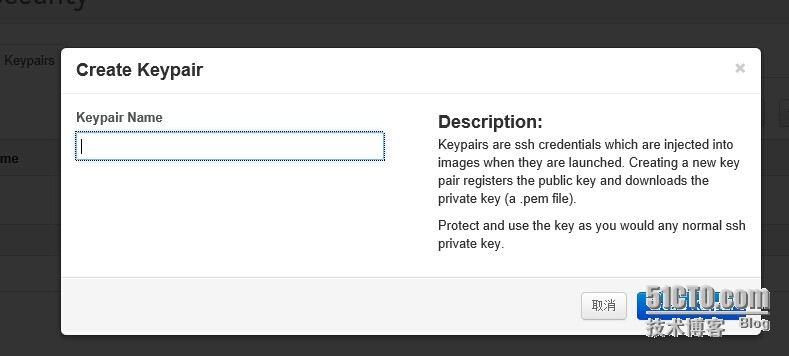
5.创建映像f19下载地址http://cloud.fedoraproject.org/fedora-19.x86_64.qcow2 创建好之后启动
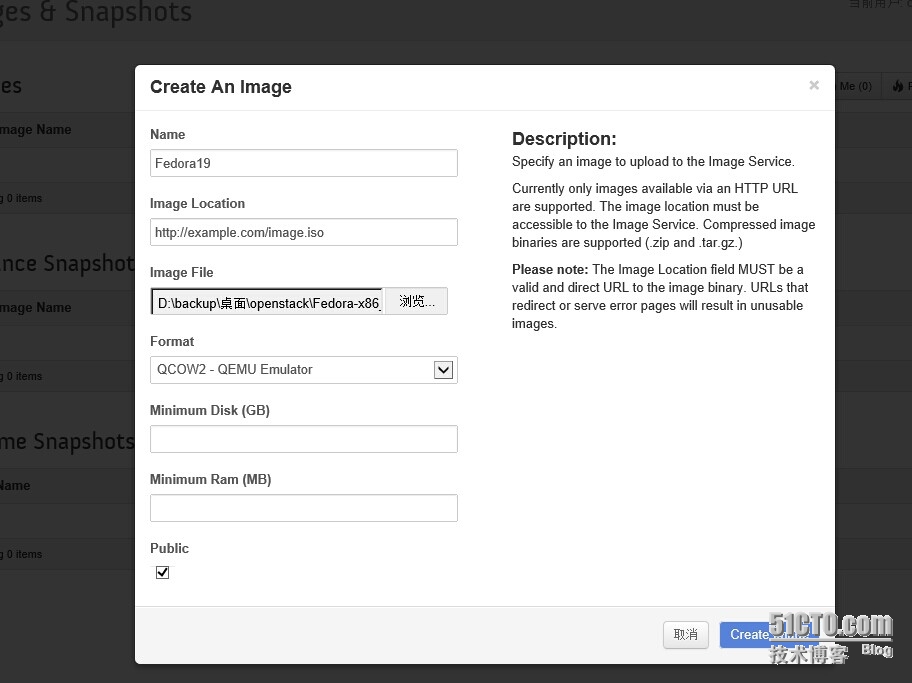
6.启动zh888实例
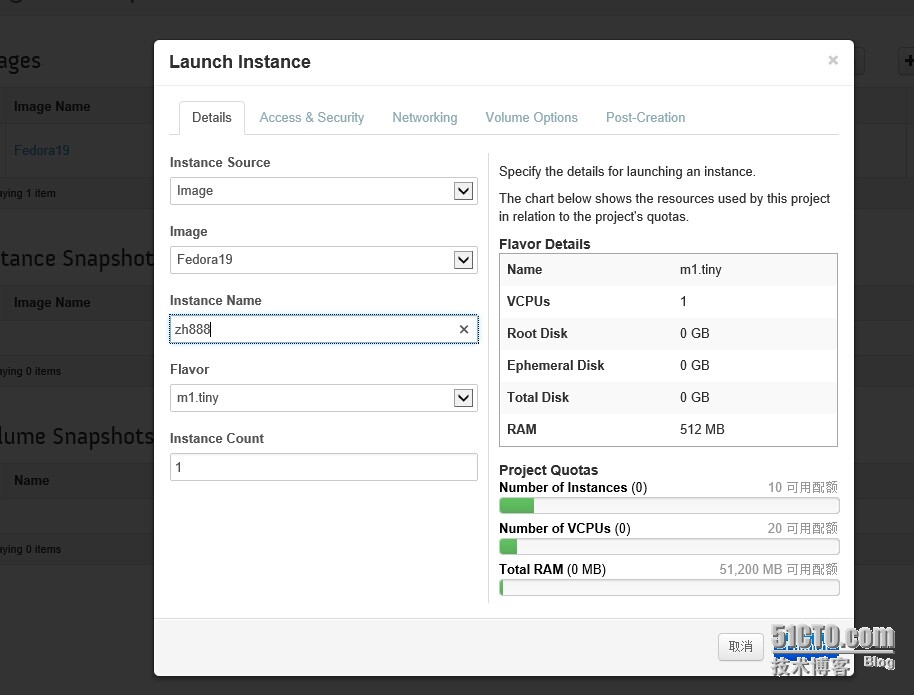
7.选择网卡点加号放入networks
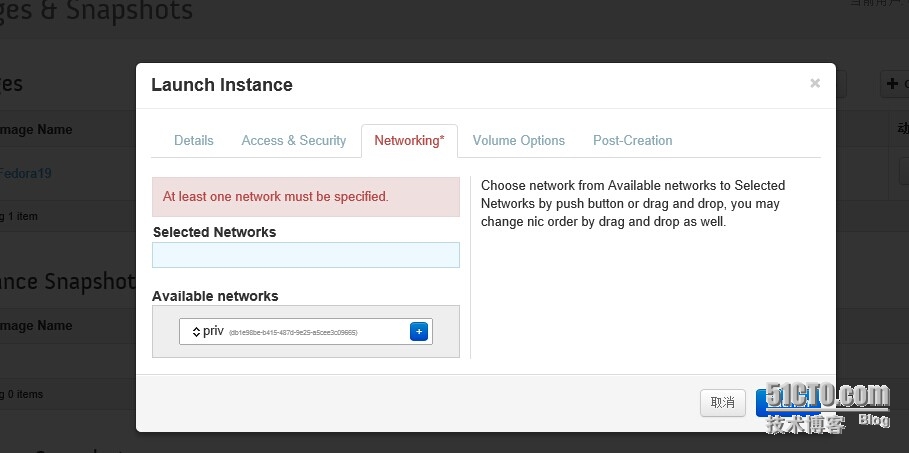
8.启动好的zh888的实例
